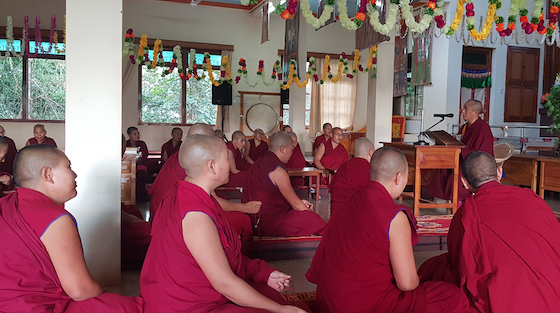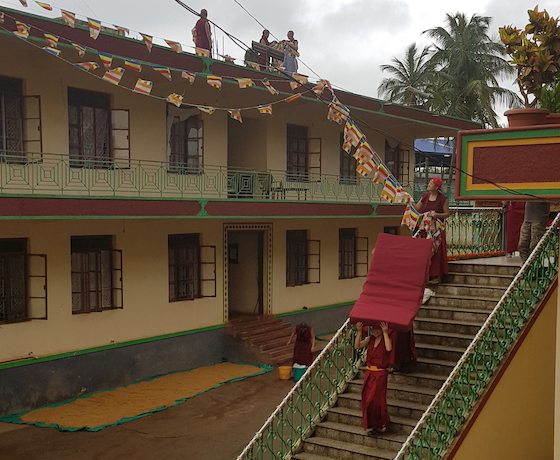2019 Geshema Exam Results
We’re delighted to tell you that the results for the 2019 Geshema exams are in. All 50 Tibetan Buddhist nuns who took their Geshema exams in August have passed. We congratulate them on their success and dedication.
The Geshema degree is the highest level of training in the Gelugpa tradition and is equivalent to a Ph.D. in Tibetan Buddhism. The degree was only formally opened to women in 2012. The Geshema degree is the same as a Geshe degree but is called a Geshema degree because it is awarded to women.
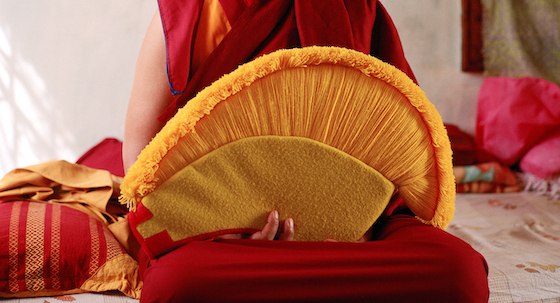
Photo of a Geshema holding the yellow hat that signifies her degree. Detail of photo by Olivier Adam.
The 2019 Geshema results are as follows:
Fourth and final year exams: all 7 nuns passed
Third-year exams: all 11 nuns passed
Second-year: all 10 nuns passed
First-year: all 22 nuns passed
The seven nuns who passed their final year of exams will take part in a week-long formal debate session in front of hundreds of nuns at the Jang Gonchoe inter-nunnery debate session. The graduation ceremony will be held in Bodh Gaya, at the conclusion of the Jang Gonchoe.
About the Geshema Degree
The first Geshema degree was conferred in 2011 to a German nun, Kelsang Wangmo.
In 2012, a historic decision was made to allow Tibetan Buddhist nuns the opportunity to take examinations for the Geshe degree, known for women as the Geshema degree. This year marks the fourth year in a row that a group of nuns will graduate with the degree.
Here’s a list of the graduations since the formal approval in 2012:
2016: 20 nuns became Geshemas
2017: 6 nuns graduated as Geshemas
2018: 10 nuns became Geshemas
2019: 7 nuns will graduate at the end of November
This brings the total number of Geshemas to 44 as of the end of 2019. This year, two of the Geshemas who graduated in 2016 were hired as teachers at Dolma Ling Nunnery and Institute.
“As a Tibetan Nuns Project Board member,” said Vicki Robinson, “I am so very proud of the achievements of the nuns who are working on the Geshema degree. It has been such a pleasure to watch these nuns assume leadership positions in the nunneries and to go where no women have gone before.”
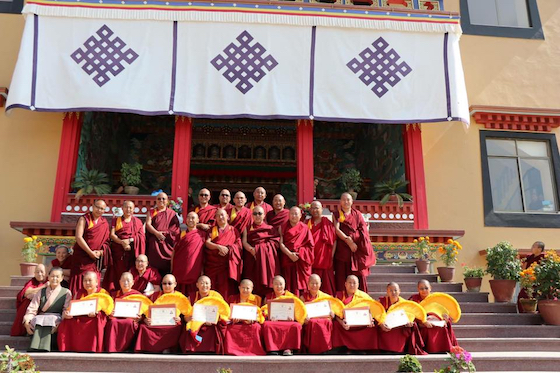
The 10 Geshema graduates in 2018 in front of Kopan Nunnery, Nepal. Photo from Kopan Nunnery Facebook page.
The Geshema Exam Process
To be eligible to take their Geshema exams, the nuns must first complete at least 17 years of study. The Geshema examination process is extremely rigorous and takes four years to complete, involving both written and debate exams and also the completion and defense of a thesis.
Each year, the nuns preparing to sit various levels of the examinations gather together for one month of final exam preparations and then for about 12 days of exams. In 2019, the exams were held at Jangchup Choeling Nunnery in South India.
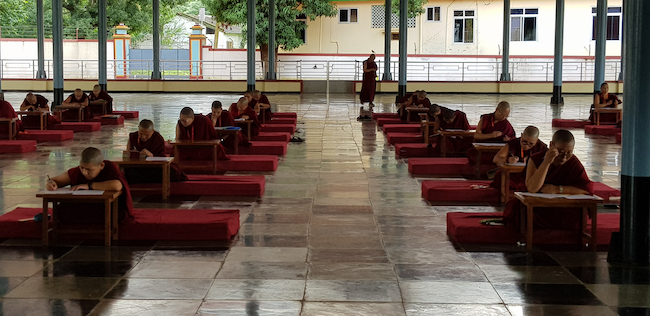
“The remarkable achievements of these excellent women are an inspiration to all,” said one supporter in her message of good luck to the nuns. Photo of the 50 nuns taking their Geshema exams in 2019 courtesy of the Nuns Media Team.
“The fact that growing numbers of women are achieving equality with men in the highest levels of Buddhist monasticism, by earning the equivalent of doctorate degrees, is joyous and of enormous importance to the world,” says Steve Wilhelm, a Tibetan Nuns Project board member. “This means that women monastics will be leading more monastic institutions, and will be teaching other women and men. Humanity needs this gender equity if we are to navigate perilous times ahead.”
The Geshema degree will make the nuns eligible to assume various leadership roles in their monastic and lay communities reserved for degree holders and hence previously not open to women.
Here’s a video about the 2019 Geshema exams. (If you can’t see the video, click here.)
Once again, we would like to thank the Pema Chödrön Foundation and everyone who supported our 2019 Geshema Exam Fund for covering the food and travel costs for the Geshema candidates.
Over 100 people from around the world sent the nuns messages of good luck before the exams started. John wrote, “Sending my best wishes to all the nuns for their testing period. I know it’s been a long journey and I am really happy for them to finally complete this process. I’ll be anxiously awaiting the final results and ready to celebrate, kicking up my heels and hooting and hollering for a good while.”
“As a USA Tibetan Nuns Project Board member, I am honored and privileged to be part of this organization. The Tibetan Nuns Project puts emphasis on the importance of education and practice as both elements enrich the entire community. Congratulations to all the Geshemas, as you have reached one of the highest levels of education. Thank you so much for your diligence and commitment to your communities.” Liza Goldblatt, Tibetan Nuns Project board member.
Robin Groth, another board member wrote, “I am thrilled by this news! This is what the work of the Tibetan Nuns Project and its donors is about — giving opportunity where it has not been before and then see lives change, dreams fulfilled, and leaders emerge. What an honor to witness this evolution.”
May this good news bring you joy! Thank you for your support!

